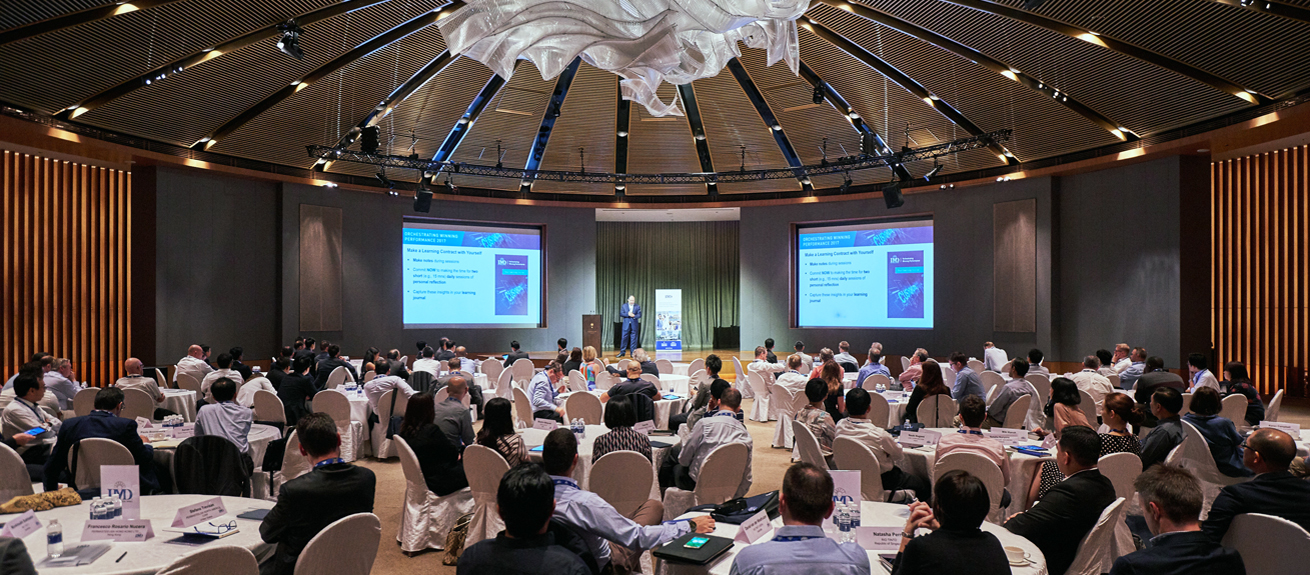
Participants of IMD’s Orchestrating Winning Performance, IMD’s fully customizable signature program currently taking place in Singapore, are immersed in a truly global and cross-cutting atmosphere with industry leaders from nearly 50 countries represented by 71 companies from 34 different industries and business sectors. It is the best setting one could think of for a transformative learning journey; away from your country, desk and office surrounded by other thinkers and leaders you would surely never meet otherwise.
Walking along the hallways of the session rooms, here are excerpts of some of the highlights from different sessions over the first days led by thought-provoking IMD faculty members:
Data is the new oil
15 years ago the world’s top firms were the likes of GE electric, oil & gas companies and large investment banks – nearly all from the US and Europe. Fast forward to 2017 and there has been a tectonic shift from the energy and finance industries giving way to a reigning dominance by the tech industry giants taking their place among the biggest corporates in the world.
This power shift is echoed geographically; among eight of the world’s most valuable companies, five of them (Apple, Google, Microsoft, Amazon, and Facebook) are from the US. Two are Chinese (Alibaba and Tencent) and one is South Korean (Samsung).
In one session, Prof. Howard Yu explores how to thrive in a world where everything can be copied. “In a way, if you look at the Fortune 500 giants of today – such as Google, Facebook and Amazon – one could argue that they are in the extraction industry; but of a different kind of material. Their business model is to extract as much personal data from as many people in the world at the lowest price and to resell that data to as many companies as possible at the highest possible price—just like industries once did with crude oil.
The dominating traditional resource-reliant industries like oil, mining, and trade whose assets were physical and tangible have shifted to Uber, Airbnb, Facebook: a move from very tangible assets to little to no physical assets which are cloud-based and intangible. The sharing economy is heralding in a new era, where the lines between physical, digital and biological have blurred as much as the lines between B2B and B2C have in recent years as businesses have been forced to become more and more customer-centric.
Customers’ expectations are now about ‘access without ownership’ as you see in sharing economy examples like co-working spaces, trading skills against services rather than money. But this digitization has also made the ability to capture value dissipate. Professor Yu takes the example of Sony music and other record/CD companies who have lost their bets to the likes of iTunes and Spotify. Just like Netflix has done to Blockbuster video rentals. “Most of the Fortune 500 companies of 2006 have disappeared and are far from dominating the rankings of success. However excellent a product is today, it is no longer enough,” Prof. Yu explains. “Customers expect much more from products today than just offering the service they are designed for”. With data analytics, a fast response time, ability to interact, the customer reviews from businesses like TripAdvisor or Uber now carry a lot more weight in brand value.
The notion of consumer trust is also transforming; government sanctions have much less sway on a brand’s value than they used to – peer user reviews or the star ratings of a grab driver matter much more. Prof. Yu resumes “Not only are we witnessing our physical world collide and merge with the cyber-world but our own personal perception of trust, safety and sense of value are all fusing into a new reality.”
Get more news from OWP Singapore on IMD’s social media channels: Facebook, Twitter, LinkedIn, Instagram, and Flickr.



